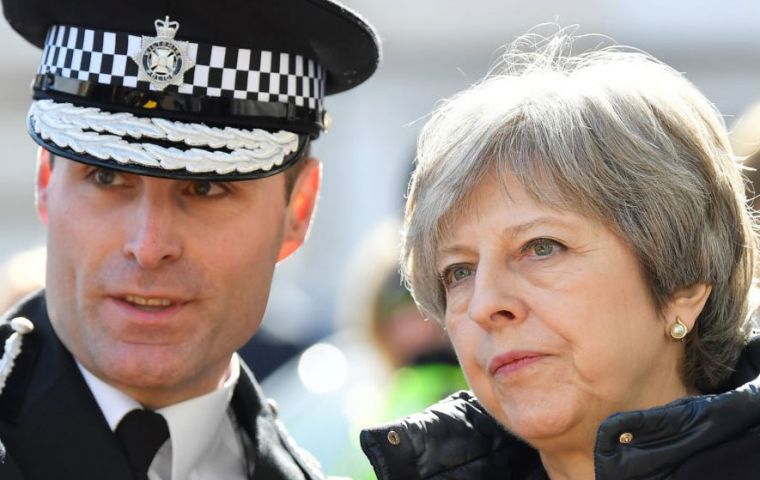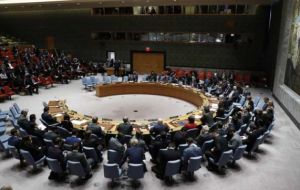MercoPress. South Atlantic News Agency
EU recalls ambassador to Moscow: “highly likely” Russia was responsible for the nerve agent attack in UK
 PM Theresa May had said the Salisbury poisoning was “part of a pattern of Russian aggression against Europe”.U.K. Prime Minister is shown the areas in Salisbury visited by (Pic AFP)
PM Theresa May had said the Salisbury poisoning was “part of a pattern of Russian aggression against Europe”.U.K. Prime Minister is shown the areas in Salisbury visited by (Pic AFP)  The European Council statement added: “We stand in unqualified solidarity with the United Kingdom in the face of this grave challenge to our shared security.”
The European Council statement added: “We stand in unqualified solidarity with the United Kingdom in the face of this grave challenge to our shared security.” The European Union has recalled its ambassador to Moscow after leaders agreed it was “highly likely” Russia was responsible for a nerve agent attack in the UK. In a statement following an evening of talks in Brussels, the European Council of EU leaders agreed “there is no plausible alternative explanation”.
PM Theresa May had said the Salisbury poisoning was “part of a pattern of Russian aggression against Europe”.
Moscow denies responsibility for the attack on an ex-spy and his daughter.
The EU said its ambassador to Russia was recalled “for consultations”. Former Russian spy Sergei Skripal and his daughter Yulia remain in critical but stable condition after the attack on 4 March.
The European Council statement added: “We stand in unqualified solidarity with the United Kingdom in the face of this grave challenge to our shared security.”
Mrs May briefed her counterparts on Thursday on the poisoning of the Skripals in Salisbury, who remain in a critical but stable condition in hospital after they were found unconscious on a bench. Detective Sergeant Nick Bailey, who became ill after responding to the incident, is no longer in a serious condition and has been discharged from hospital.
The prime minister set out the evidence the UK has against Russia - including the positive identification of the chemical used as a type of Novichok nerve agent and the knowledge that Russia has produced this agent within the last 10 years.
Lithuanian President Dalia Grybauskaite has said she is considering following Britain's lead by expelling Russian spies from her country.
But Greek PM Alexis Tsipras said while he wanted to “express solidarity” with Britain “we also need to be responsible on that issue”.
Arriving in Brussels earlier, Mrs. May said: “Russia staged a brazen and reckless attack against the United Kingdom. ”It's clear that the Russian threat does not respect borders and indeed the incident in (the town of) Salisbury was a pattern of Russian aggression against Europe and its near neighbors from the Western Balkans to the Middle East.“
She added that, as the leaders remembered the victims of terrorist attacks in Westminster and Brussels, she would be ”stressing the UK's unconditional commitment to the future security of Europe“.
But the Russian ambassador to the UK, Alexander Yakovenko, said Britain had blamed Russia for the poisoning ”without any evidence“ and his country cannot accept that”.
He also described as “totally irresponsible” the comments by Foreign Secretary Boris Johnson on Wednesday that likened the public relations gains to President Putin from this summer's Football World Cup in Russia to Adolf Hitler's use of the 1936 Berlin Olympics.
“Nobody has the right to insult the Russian people, who defeated Nazism and lost more than 25 million people, by comparing our country to Nazi Germany,” said Mr Yakovenko.
Meanwhile, a senior Whitehall official said Russia had “shown itself to be a strategic enemy not a strategic partner”. The official stressed that the UK's response to the Salisbury attack had been carefully calibrated to remain within the law, and that the UK was “not looking for some big confrontation with Russia or regime change”.
Labour leader Jeremy Corbyn repeated his calls for a “robust and serious dialogue” with Russia, and hoped for a statement of support for the UK from the EU after the summit.
“We live in one continent ” he said. “We have to have a process where difficulties can be dealt with.” But Mr Corbyn questioned statements by some members of government, adding: “I'm not sure the language used by some of our ministers is particularly helpful or sensible.”




Top Comments
Disclaimer & comment rules-

-

Read all comments“I'm not sure the language used by some of our ministers is particularly helpful or sensible.”
Mar 23rd, 2018 - 06:37 pm 0You don't say. Boris is Boris, but of all the jobs May could have given him, why Foreign Secretary?
https://www.craigmurray.org.uk/archives/2018/03/boris-johnson-a-categorical-liar/
Mar 24th, 2018 - 10:26 am 0Commenting for this story is now closed.
If you have a Facebook account, become a fan and comment on our Facebook Page!